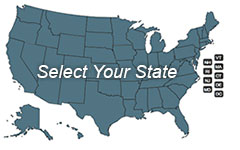Mental Health Counselor Licensure in Maine

Maine mental health counselors are granted Licensed Clinical Professional Counselor (LCPC) licenses. The LCPC is one of two licenses that authorizes independent practice as a counselor. The Board of Counseling Professionals states that it is intended for counselors who treat and diagnose mental disorders.
Full licensure is granted only to professionals who have met a post-master supervised practice requirement. Graduates hold conditional licenses while accruing their experience hours.
- Featured Online CACREP Accredited Master's in Counseling Program Options:
- Liberty University, a non-profit university, offers a CACREP accredited online Master of Arts in Clinical Mental Health Counseling. Click here to learn more about Liberty University and their Master of Arts in Clinical Mental Health Counseling.
- Prepare for counseling licensure in as few as 27 months with Pepperdine’s online MA in Clinical Psychology - no GRE required. The program is top ranked for return on investment (ROI) by OnlineU.
- Southern New Hampshire University (SNHU) offers a CACREP accredited online BA in Psychology - Mental Health. Click here to learn about the counseling programs at SNHU.
- Grand Canyon University offers an M.S. in Clinical Mental Health Counseling with an Emphasis in Childhood and Adolescence Disorders; Christian Counseling; Marriage & Family Therapy and Trauma.
- Sacred Heart University's Master of Arts in Clinical Mental Health Counseling is offered online and was developed based off CACREP standards to prepare graduates for licensure in most states. Click here to learn more about Sacred Heart University and the online Master of Arts in Clinical Mental Health Counseling.
Select a Maine Mental Health Counselor Licensure Topic:
- Licensed Clinical Professional Counselor Education Requirements
- Required Examination
- Supervision Requirements
- Application Process
- Out-of-State Counselors
- Contacts and Additional Information
Educational Requirements
An LCPC must complete a program that includes a minimum of 60 graduate semester hours. The program can be accepted if it is accredited by the Council for Accreditation of Counseling and Related Educational Programs (CACREP). Also acceptable is a doctoral level clinical or counseling psychology program that is accredited by the American Psychological Association or Canadian Psychological Association or a non-accredited counseling program that meets the Board’s content area requirements (http://www.maine.gov/sos/cec/rules/02/chaps02.htm#514).
Candidates will need coursework in the following content areas:
- Human growth and development
- Social and cultural foundations
- Helping relationships (including counseling theory and skills)
- Diagnosis and treatment
- Groups
- Research and evaluation
- Measurement
- Professional orientation
- Practicum
- Internship
On the application form, the candidate will document one three-unit course in each of the following:
- Treatment modalities
- Marriage and family therapy
- Human sexuality
- Lifestyle and career development
- Addictive disorders
- Crisis intervention
- Consultation
- Supervision
The application packet includes a description of content to be covered in each required area.
The practicum is the student’s first experience taking on LCPC duties; the year-long internship provides the opportunity to take on a role more like that of an employed LCPC. In most cases, a student will need fully 900 hours of clinical internship. The Board has the authority to accept “alternative experience” gained lawfully in other jurisdictions in lieu of internship hours; candidates who cannot document this may re-enroll in counseling programs in order to complete their internship requirements.
Examination Requirements
Licensure as an LCPC is dependent on passing two examinations, both administered by the National Board for Certified Counselors. The first is the National Counselor Examination, or NCE; the second is the National Clinical Mental Health Counseling Examination, or NCMHCE.
Some students enroll to take the NCE through their schools. Others take it as part of the national counselor certification process. Maine candidates who do not fit into one of these categories must seek authorization through the Board of Counseling Professionals. They may submit NCE examination requests to the Board along with application materials for conditional licensure.
There are monthly testing windows for each examination. A candidate will pay the required fee (currently $195) directly to the NBCC, then wait approximately four weeks for authorization to schedule an exam. Computer-based examinations can be scheduled at the Portland or Holden AMP sites or at other authorized sites throughout the nation.
Candidate guides for each examination are available on the “Maine” page of the NBCC website (http://www.nbcc.org/directory/ME). The Maine Board refers candidates to the NBCC for additional study resources. Candidates with questions about the registration process may contact the NBCC at 336-217-4111.
Supervised Clinical Experience
A prospective mental health counselor will seek the LCPC-Conditional License after graduation – this includes any counseling graduate whose job duties will include diagnosing and treating mental disorders.
A conditionally licensed counselor must accrue 3,000 experience hours; at least 1,500 must consist of direct client contact. The conditionally licensed clinical counselor will need at least 100 supervision hours. No fewer than 50 may consist of individual supervision. The supervisor may be an LCPC, psychiatrist, psychologist, Licensed Marriage and Family Therapist, Licensed Pastoral Counselor or social worker with one of the following designations: LMSW-CC, LCSW, CSW-IP: LMSW-CC, LCSW, or CSW-IP (https://www.maine.gov/pfr/professionallicensing/faq). The supervisor must meet Maine standards for training and/ or experience. A supervision plan must be submitted to the Board.
A counselor must work under supervision for at least two years. Some conditional licensees take longer to accrue hours. The conditional license can, if necessary, be renewed twice. The LCPC-Conditional will continue under supervision until full licensure has been granted.
The Application Process
Applicants are advised to read the licensing laws and rules before submitting applications. The same application packet is used for full and conditional licensure (http://www.maine.gov/pfr/professionallicensing/professions/counselors/laws.html). Counselors who are licensed at the conditional level are candidates for ‘change of status’.
Three professional references are required; these are due with the application for conditional licensure. The file must also include official transcripts and internship verification. The candidate will include supporting documents to verify course content.
The candidate will also prepare a professional disclosure statement. This includes information such as license category, areas of competence, diagnostic and treatment procedures, and payment methods. Conditional licensees include a brief explanation of how the status may affect procedures. The professional disclosure statement must be revised in anticipation of change of status. A sample disclosure statement is included in the application packet.
There are three separate fees associated with the application and licensing process: $25 for application, $21 for criminal history record check, and a variable fee for licensure ($200 at the conditional level and $250 at the permanent level). The Board notes that the three fees can be paid as one.
Applications may be mailed or hand delivered but not faxed. The mailing address is in Augusta, the physical address in Gardiner. Both addresses can be found in the application packet.
Applicants are asked not to call the Board office to inquire about application status, but are invited to monitor status online.
Out-of-State Counselors
The Maine Board does not currently have reciprocity agreements in place with other states. Out-of-state counselors can apply on the basis of having substantially equivalent licenses (Pathway 2) or having met substantially equivalent qualifications (Pathway 3).
Out-of-state counselors must provide a copy of the laws and rules governing licensing or certification in the other jurisdiction; these must cover scope of practice. Only counselors who have been licensed for at least five years are eligible to apply through Pathway 2. Pathway 3 candidates must supply additional documents.
Out-of-state counselors must write professional disclosure statements that reflect their proposed practice within the state of Maine.
Additional Information
Contact information for the Maine Board of Counseling Professionals is found online (https://www.maine.gov/pfr/professionallicensing/professions/board-of-counseling-professionals-licensure).
The Maine Mental Health Counselors Association is the state professional organization (https://memhca.org). MEMHCA provides resources such as a mentorship program, an annual conference, and a list of potential supervisors. It does not issue licenses.
Find Mental Health Counselor Licensure Requirements in Your State:

Learn about becoming a Mental Health Counselor in your state:
To View Full U.S. Map Click Here.